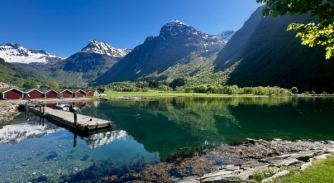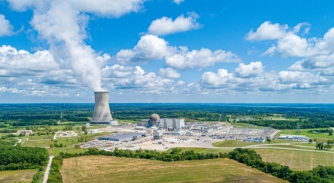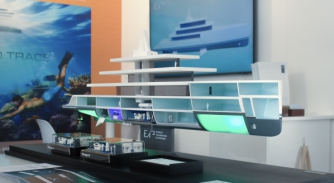Let’s not overreact to nuclear
Exploring a powerful topic of conversation and confusion…

Perhaps the story of nuclear has more to it than people appreciate; however, the word ‘nuclear’ needs some consideration – maybe ‘fusion energy’ or ‘reactor’ can tone down the language and make this clean energy source more palatable. There have been workshops, forums, conferences and comments on the application of nuclear in the superyacht arena; every Class society has created a white paper or guide to nuclear technology in shipping and the maritime sector, so there must be something worth exploring and better understanding.
If you asked any conventional owner, charter broker, yacht broker, chief engineer and other key decision maker in the market today whether they would like to own, charter, operate or manage a nuclear-powered superyacht, it’s easy to predict the overwhelming rejection and potential negative response, “Are you crazy?”. However, the more questions you ask of those in the know who have explored the technology, the more you realise that something is on the horizon that cannot be ignored. If the Class societies are exploring reactors, they must think there is a real purpose to this ultra-clean zero-emission energy source.
Another nuclear distraction hit my inbox and news feed: the fact that Amazon, Google and Meta are all focused on significantly increasing global nuclear capacity in the next 25 years. Very simply, with their energy consumption in the world of AI and big tech, these energy-hungry entities need to futureproof their demands but have to explore clean energy supply.
Google’s Lucia Tian, Head of Clean Energy & Decarbonization Technologies, says: “We are proud to sign a pledge in support of tripling nuclear capacity by 2050, as nuclear power will be pivotal in building a reliable, secure and sustainable energy future. Google will continue to work alongside our partners to accelerate the commercialisation of advanced nuclear technologies that can provide the around-the-clock clean energy necessary to meet growing electricity demand around the world.”
In a step toward advancing the development of floating nuclear power plants (FNPPs), ABS, CORE POWER and Athlos Energy have formed a consortium to evaluate the potential of positioning the platforms to meet the energy demands of islands, ports and coastal communities in the Mediterranean Sea.
The group will research how FNPPs can potentially unlock a range of applications including the establishment of grid-scale electricity to remote locations, the delivery of emission-free energy to ports and the distribution of reliable clean energy to desalination plants that could provide potable water to drought-affected coastal communities.
“Floating nuclear power plants can revolutionise the way we deliver reliable and affordable nuclear energy to provide vital carbon-free energy security to islands and coastal infrastructure
in the Mediterranean.”
“As global efforts accelerate to reduce emissions, improve energy efficiencies and strengthen energy security, the use of small modular reactors on floating platforms could offer a viable alternative. Floating nuclear power facilities show promise in supporting power grids, microgrids, industrial and port operations and data centres, among others,” says Christopher J. Wiernicki, ABS Chairman and CEO.
“FNPPs can revolutionise the way we deliver reliable and affordable nuclear energy to provide vital carbon-free energy security to islands and coastal infrastructure in the Mediterranean. By constructing and mass-assembling a fleet of FNPPs in shipyards, we can deliver clean nuclear energy on time and budget, solving many of the largest energy challenges we face. CORE POWER is delighted to partner with industry leaders ABS and Athlos on this project,” says Mikal Bøe, CEO of CORE POWER.
“As Greece reconsiders its energy future, the role of nuclear power is increasingly back on the agenda. This study marks an important first step in accessing the feasibility of deploying floating nuclear reactors in the Aegean Sea,” says Dionysios Chionis, co-founder Athlos Energy.
So let’s consider the application of nuclear in the marine sector. Small modular reactors and micro-reactors are currently being investigated and tested for large-yacht applications, highlighted by some of the experts at the recent INNORVATION event in Alesund, hosted by DNV. These are small compact reactors that generate clean and stable energy, with zero emissions. But if you consider the ABS topic above, the idea of floating nuclear energy platforms, if these gain serious traction and approval, providing stable clean energy across the Mediterranean would be a huge step forward, especially with the evolution of electric and hybrid yachts that need fast and clean charging at scale.
We all remember the arrival of the PR machine behind the Earth 300 project, the vast and unique nuclear-powered scientific research ship/superyacht, a project with a glass sphere at the heart of the project, recently partnering with DNV to look at nuclear in the maritime sector. “This partnership with DNV represents a crucial milestone in bringing our vision to reality,” says Aaron Olivera, Founder and Chief Executive Officer of Earth 300. “Their expertise in maritime classification and nuclear technology regulation will be instrumental in navigating the complex challenges of developing the world’s first ever nuclear-powered civilian research vessel.”
“Oppositions to emission-free energy, at a time when we need it most, is one of
the great contradictions of our time.”
And finally, my morning news feed brought me an alert that the IMO has agreed to start a revision of the outdated regulations for nuclear-powered ships. During a presentation by the World Nuclear Transport Institute (WNTI) to MSC 110, just after IMO member states had agreed that revision of the nuclear code should go ahead, Mikal Bøe, CEO of CORE POWER, thanked the IMO delegates for their support and welcomed closer links between the global maritime regulator and the International Atomic Energy Agency (IAEA). “This means that we can move forward to create the international framework that governs the safety and security of civilian nuclear shipping,” says Bøe.
Later this year, the IAEA will formally launch the Atomic Technology Licensed for Application at Sea (ATLAS) project, which aims to facilitate the regulatory frameworks needed to deploy needed to deploy nuclear propulsion and floating nuclear power plants.
Having been a minor sceptic about the idea of nuclear in yachting and then inundated with news, comments and major features and reports highlighting the benefits and real potential, it seems that nuclear cannot be ignored. A recent piece in the Weekend FT resonated and is worth quoting, to put things in context, “Nothing will ever stop atomic energy from unsettling mankind. It is strange and miraculous that by rearranging the internal structure of the atomic nucleus, we are able to release energy ‘in amounts that are over a million times larger – atom for atom – than anything made available during the first two industrial revolutions’.”
“Oppositions to emission-free energy, at a time when we need it most, is one of the great contradictions of our time,” states Tim Gregory, nuclear chemist at the UK’s National Nuclear Laboratory.
Listening to and reading a lot of the extensive reporting on nuclear, with micro-reactors and molten salt reactors, has definitely changed my opinion on the future of nuclear at sea and on the coast. It may not be tomorrow, but when you consider the energy and emission output, it cannot be ignored.
Profile links
NEW: Sign up for SuperyachtNewsweek!
Get the latest weekly news, in-depth reports, intelligence, and strategic insights, delivered directly from The Superyacht Group's editors and market analysts.
Stay at the forefront of the superyacht industry with SuperyachtNewsweek
Click here to become part of The Superyacht Group community, and join us in our mission to make this industry accessible to all, and prosperous for the long-term. We are offering access to the superyacht industry’s most comprehensive and longstanding archive of business-critical information, as well as a comprehensive, real-time superyacht fleet database, for just £10 per month, because we are One Industry with One Mission. Sign up here.
Related news

InNORvation ’25
TSG’s Chairman reflects on the most memorable event of his career – held in Norway last month with an invite-only gathering of 50 brilliant min
Business
.jpg)
Yacht owners push for nuclear power
More owners are pushing for nuclear power on board, some by the end of the decade, according to a recent Lloyd’s Register report
Crew

Nuclear-powered yachts: a viable option towards achieving net-zero emissions?
Imagine a very large yacht capable of cruising the world non-stop without refuelling or requiring an expensive chase boat. Could this become a reality?
Crew

Are we on the brink of the nuclear option?
This year's Superyacht Forum saw a lively and fruitful discussion on the use of nuclear power in yachting
Technology

ABS approval for Energy Transition Platform
Lateral Naval Architects Secure Approval in Principle from ABS for its Modular Energy Transition Platform
Fleet
Related news
InNORvation ’25
9 months ago
Yacht owners push for nuclear power
1 year ago
Are we on the brink of the nuclear option?
2 years ago
ABS approval for Energy Transition Platform
2 years ago
NEW: Sign up for
SuperyachtNewsweek!
Get the latest weekly news, in-depth reports, intelligence, and strategic insights, delivered directly from The Superyacht Group's editors and market analysts.
Stay at the forefront of the superyacht industry with SuperyachtNewsweek



